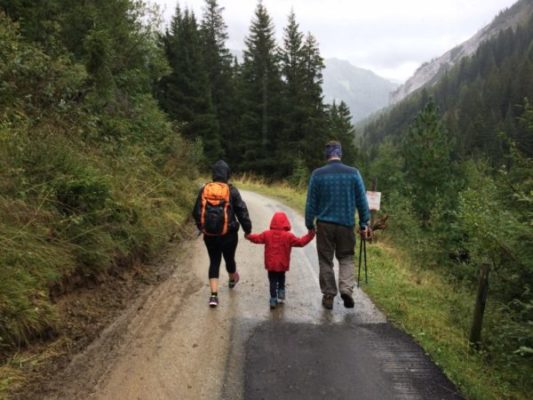
Moving overseas to a military post/base is one thing, but moving overseas to a place that is not affiliated with the military in any way is an entirely different beast.
When you move to an overseas base, there are people there to welcome you (hopefully); people who speak English; people who understand how pretty much everything is unpredictable; people who can tell you the good schools vs. not so good; and people who value the work that your spouse does day-in and day-out.
Moving overseas without any of those friendly strangers waiting for you, is an experience all its own.
Recently my husband was selected for an overseas language immersion program, the Olmsted Scholar Program, and we moved to Buenos Aires, Argentina three months after we were notified of his nomination. This is something we wanted desperately, but it did not make the transition any less surprising!
It pushed us out of our comfort zones. We were alone.
We were together ALL THE TIME. And we only had each other to talk to because of the language barrier, and not one single person we met knew anything about the life of an American military family.
Why would they?
We had to find a school for the girls to attend without any recommendations, other than the international school that speaks English, which we did not consider since we are here to learn the language (not to mention the hefty price tag of the international school … especially for a 3-year-old who is learning important things like how to color inside the lines). We had to find and negotiate a place to live and decide the best way to learn the language. There were many decisions that are usually very easy when moving overseas that suddenly became challenging.
Though it came with many obstacles, this is by far the most interesting and eye opening ‘assignment’ of our career. I would offer five recommendations to anyone who finds their family in a similar situation.
1. Remember it’s only temporary.
I am talking about the being together ALL THE TIME. As military spouses, we are not used to this gift, and it can be a little overwhelming. Miss Independent became a little fussy when she had someone helping with all the decisions in the beginning. Quickly, I reminded her to relish these moments because they are fleeting. Instead of being annoyed, be grateful to have two perspectives. Don’t forget to laugh at the ridiculous things; it really relieves the stress and helps put them into perspective.
2. Give your children time.
The adjustment to schools overseas in a new language is exciting at first because they are the shiny new toys that everyone wants to play with. That wears off rather fast, and they become frustrated and act out because they do not understand anything that is going on at school. They feel alone. They feel overwhelmed. Imagine yourself walking in a room not knowing how to talk to anyone and everyone just stares at you all day, every day; it’s isolating. Let them cry, be patient and give them time. It takes about six months, but they will learn the language, make friends and be joyfully content in their new surroundings. It is an exhausting six months, but it is worth it. Kids are so resilient.
3. Embrace embarrassment.
Seriously, just learn to love being embarrassed by your terrible Spanish (or whichever language). At least this means you are interacting with people and making friends. Laughing at yourself is the best way to make friends because it means that you are approachable. As nervous as you are about speaking another language, the people you are interacting with are just as nervous about being uncomfortable with you. So relax!
4. Use your children as an outlet.
Kids are the greatest conversation starters, and the best way to meet people. Having children, especially school-age children, will force you into social settings and that is good for you! We have multiple friends here that we would not have met if it were not for our children. And these are always fantastic opportunities to practice recommendation No. 3!
5. Embrace the place.
No matter where the military sends you, there is always something fantastic to discover. Whether it is a landscape particularly unique to where you are living or a plethora of museums, don’t waste your opportunity. Get to know where you are living. Explore the city festivals. Take walks to the park with the paddle boats even if it is a little far. Go for a hike. Visit the botanical gardens. Whatever it is, do it. The more you can see that is special to your location, the more you will love that location. You don’t want to leave an assignment and feel like you were never comfortable there. And as always, being involved in your community or surrounding area is a great way to utilize numbers 3 and 4.










